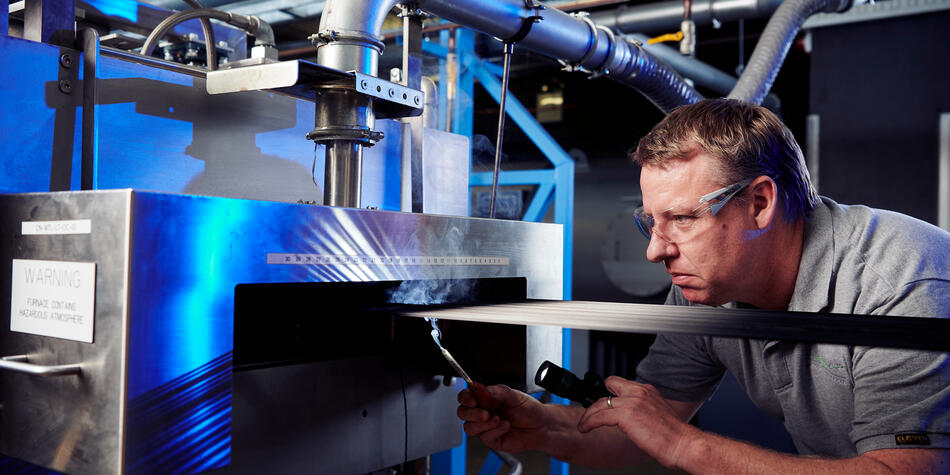Carbon Nexus is the world’s most advanced carbon fibre and composite research facility, driving globally significant, university-based industrial-scale research. Located at Deakin University’s Future Economy Precinct, Carbon Nexus plays a crucial role in fostering the growth of Australia’s carbon fibre industry and advancing lightweight, sustainable solutions across key sectors.
World-class facilities fostering innovation
As the only facility of its kind, Carbon Nexus meets the needs of industries seeking to replace aluminium and steel in their products, including aerospace, automotive, sporting goods, transportation and renewable energy.
With the world’s only industrial-scale carbon-fibre pilot production line on a university campus, Carbon Nexus offers access to research and development services from precursor development to composite manufacturing delivered by a team of globally recognised, advanced materials experts.
Professor Russell Varley, the research leader of Carbon Nexus, leads a team of cutting-edge researchers working to solve the challenges faced by the manufacturing industry. His team is internationally recognised for their innovative work, including the development of a self-healing polymer that enhances the performance of steels used in oil field operations.
Bridging research and industry
In the early 2000s, Australia faced a risk of falling behind in manufacturing, with industry demand for lightweight, low-cost and energy-efficient carbon fibre and advanced composite materials increasing rapidly.
With the closure of iconic factories like the Ford Australia plant and Alcoa’s Point Henry smelter in Geelong, the region recognised an opportunity in 2006 to connect research and industry in response to the shifting industrial landscape.
This led to the establishment of Carbon Nexus and efforts to position Geelong as an international hub for research into advanced fibre materials. The original project partners, Deakin University, the Commonwealth Scientific and Industrial Research Organisation (CSIRO) and the Victorian Centre for Advanced Materials Manufacturing, set the stage for significant innovation in advanced manufacturing technologies.
Transforming manufacturing with a global vision
A global perspective is central to Carbon Nexus’ mission. The development of lightweight, low-cost and energy-efficient carbon fibres is an essential factor in reshaping not just Australian manufacturing, but the global landscape. As industries worldwide strive for more sustainable manufacturing solutions, carbon fibre’s outstanding properties – lightweight and high-strength – make it an increasingly attractive choice.
‘As the global economy demands greater sustainability and resource efficiency in manufacturing, carbon fibre has become extremely attractive because of its outstanding lightweight high-strength properties. At Carbon Nexus, our research therefore strongly focuses upon industry's needs, to help our partners take advantage of this strongly growing carbon fibre market,’ says Professor Varley.
Through its research and partnerships, Carbon Nexus is not only contributing to the local economy but is also positioning Australia as a key player in the global carbon fibre market.
The technologies Carbon Nexus has created establish it as one of Australia’s most important research infrastructure investments. We're growing our research base, developing people and supporting emerging industries that will have a profound impact in the coming decade.
Professor Russell Varley
Carbon Nexus Director of Research and Research Group Leader
A decade of carbon manufacturing
Carbon Nexus has spent the past 10 years driving innovation and making a lasting impact as the world’s most advanced carbon fibre and composite research facility.
Since its establishment in 2014, Carbon Nexus has led global carbon fibre manufacturing, forging partnerships with industry leaders. Early in its history, the facility achieved a landmark milestone by producing Australia’s first entirely home-grown carbon fibre.
In the past decade, Carbon Nexus has created more than 1,400 jobs in the Geelong region, helping displaced manufacturing workers transition into advanced industries. The facility has also attracted global companies such as Quickstep Holdings, which relocated its automotive research and development from Germany to Geelong in 2015.
Professor Varley reflected on the facility’s achievements and its role in advancing both industry and sustainability: ‘I’m proud of the significant achievements we’ve made at Carbon Nexus so far. We’re working at the intersection of academia and industry to break new ground in the science and engineering of carbon fibre production.
‘For example, we’ve created carbon fibre designed specifically for wind turbine blades, contributing to a zero-emission and renewable energy future,' Professor Varley said. 'Looking ahead, we are also creating high-quality, sustainable carbon fibre, made entirely from agricultural waste.’
Throughout its first decade, Carbon Nexus has not only supported industries including aerospace, automotive, construction, renewable energy, and oil and gas but has also cemented its reputation as a global leader in sustainable manufacturing practices.
Commercialisation and collaboration
The establishment of Carbon Nexus has been a catalyst for the growth of the Future Economy Precinct, where industrial partners co-locate with Deakin University and CSIRO to accelerate the commercialisation of advanced manufacturing technologies.
Among the significant achievements is an award-winning, world-first carbon fibre composite production process that was commercialised by Multimatic, producing parts for the Mercedes AMG S-Class. Additionally, a new, cost-effective and energy-efficient carbon fibre manufacturing process was licensed for 20 years to LeMond Composites (USA) in a deal valued at $58 million.
These innovations have attracted substantial investment, allowing the facility to procure additional equipment and enhance its research and development capabilities.
Carbon Nexus also collaborates with leading industry partners such as Vestas, Boeing, the Ford Motor Company, Dow Chemical and Daimler, while facilitating the creation of new businesses. Notable start-ups emerging from the facility include Carbon Revolution, which developed the world’s first single-piece carbon fibre automotive wheels; Quickstep, a developer of composite components for the defence industry; and JUC Surf, a company that produces surfboards made from recycled carbon fibre.
Explore how Carbon Nexus is shaping the future of advanced manufacturing and sustainable innovation.

